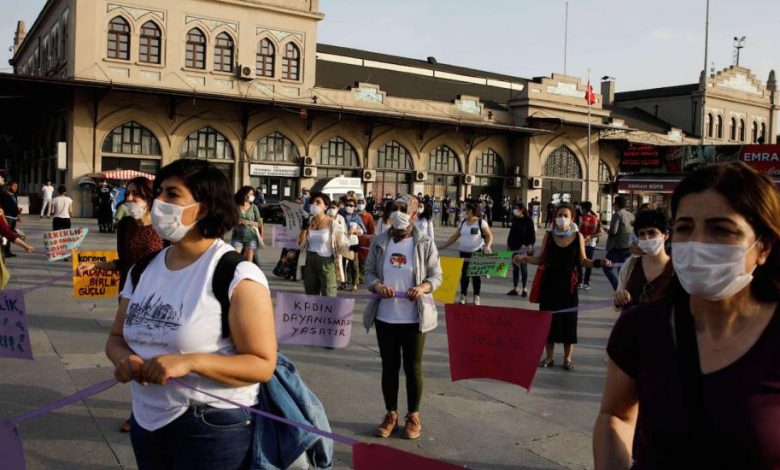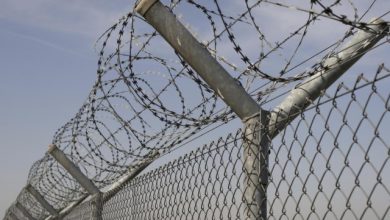Turkish women’s rights movement fights back as COVID-19 spurs violence
“There’s a virus outside and there’s violence inside.”

Just after dawn in the Turkish city of Muğla on Sunday, 26-year-old Selim Ahmet Kemaloğlu, a boxer with aspirations to make Turkey’s national team, grabbed a bread knife and stabbed his girlfriend, 25-year-old Zeynep Şenpınar, in the chest.
Şenpınar, who liked to sing folk songs and graduated from a nearby university last year hoping to be a teacher, died on the spot. Kemaloğlu then stabbed himself, called emergency response and posted a tweet saying he had killed two people. He survived and remains in police custody.
Şenpınar’s killing again put the spotlight on one of Turkey’s festering horrors. The number of murdered Turkish women has leapt more than 63 percent in recent years, from 303 in 2015 to 474 last year, according to data from the Ankara-based advocacy group We Will Stop Femicide. The number of Turkish women who have suffered violence has surged 50 percent, from 145,000 in 2015 to nearly 220,000 in 2018, according to Interior Ministry data.
Human Rights Watch and other leading advocates have pointed out that domestic abuse has intensified during the pandemic, as many women are trapped at home with potential abusers and minimal access to support. An April survey by a Diyarbakır-based organisation found violence against women in Turkey increased 28 percent in the first weeks of lockdown, while Istanbul police recorded a 38 percent increase in domestic violence in March.
“The most dangerous place for women is their home,” Melek Önder of We Will Stop Femicide told Ahval in a podcast, adding that the number of calls to the platform’s hotline had increased by more than 50 percent during the pandemic.
“With everybody staying at home it causes different kinds of difficulties for women,” she said. “There’s a virus outside and there’s violence inside.”
We Will Stop Femicide has posted guidelines on its website to help project women during the lockdown. Women unable to make a phone call to the police or a helpline are advised to send a text message to the platform’s WhatsApp number.
Women are also advised to reach out to somebody they trust – a close friend, relative or neighbour – and agree on a response plan in the event of imminent danger. This could include a code word to alert someone of the threat without the possibility of the abuser finding out. The guidelines also urge women to document any injuries with photos and videos and mark the date by going to the hospital to get a battery report.
Most advocacy groups agree that a key reason for Turkey’s domestic violence problem is the failure of the Justice and Development Party (AKP) government to implement the relevant laws, particularly the Istanbul Convention and a 2012 law to curb violence against women.
“If these are implemented effectively, we know that femicide would be really decreasing, and also domestic violence,” said Önder, adding that the root problem in Turkey is a deep-seated patriarchal culture that views women as unfit for decision-making and mainly good for domestic roles.
“In Turkey, men are thinking they have the power to control women. They think they can decide when you live or die, work or not, have economic independence or not,” she said.
At 32 percent, women’s labour force participation in Turkey is just over half the Organisation for Economic Co-operation and Development (OECD) average of 60 percent – a symbol of the extent to which women continue to be forced into domestic roles.
Violence against women will only fall, according to Önder, when Turkey is able to establish equality in politics, in society, in the economic arena and within the family.
“The government and the people who manage the country are saying that nobody will believe in this equality,” she said. “But first the politicians and the government must apply this equality and then the people and individuals will follow this path.”
Turkish officials seem to take their cues from President Recep Tayyip Erdoğan, who has explicitly said men and women are not equal and urged women to have three children.
The day after Şenpınar’s murder, Hamdullah Arvas, an AKP member of the Istanbul city council, appeared to legitimise the killing by describing her, in a tweet, as a “freedom-loving woman who was having an extramarital life.” He pointed out similarities with the stories of other women killed in Turkey, and wondered if such acts were “perception management that is done on purpose”, adding the hashtag #decency.
Arvas was roundly criticised on social media, particularly by women’s rights groups. “Those who question women’s lifestyles and give men this courage are responsible for Zeynep’s death,” We Will Stop Femicide responded in a tweet.
Early this month, the AKP revived a 2016 draft law that aims to grant amnesty to rapists who marry their victims, as long as they are aged 14 or older.
Fatih Erbakan, head of the Welfare Party and the son of Erdogan’s political mentor, former prime minister Necmettin Erbakan, said in an interview this month that the consent of 15-year-old girls was valid because they had reached sexual maturity.
Canan Güllü, head of the Federation of Women’s Associations in Turkey, told Bianet this week that marriages for girls aged 10 to 15 have been sharply increasing in Turkey and the state was largely to blame. The new draft law could come before Turkey’s parliament in the coming weeks.
“The child does not have consent,” said Önder. “This will open the way to forced marriage and child abuse at an early age. We are saying that we will not allow it.”
That stronger stance for Turkish women may have begun in February 2019, after pop singer Sıla Gençoğlu posted images of her bruised and battered face on Instagram and said that her actor boyfriend Ahmet Kural had beaten her. The post quickly received more than a million likes and led to a story in the Washington Post arguing that Gencoglu had offered an example of how to fight back.
“It had an impact because women are seeing that all women in Turkey can be part of this violence,” said Önder. “It’s not depending on your economic situation or ethnicity…violence and femicide is an issue for all women.”
Last December, following large protests, a Turkish court sentenced the lead defendant in the rape and murder case of 23-year-old student Şule Çet, which had initially been ruled a suicide, to life in prison – a sign of progress in a country where such perpetrators have long received a slap on the wrist.
The next month, Turkey announced a slate of new measures to curb violence against women: security personnel will receive sensitivity training, anti-women violence units will be created within the police, special courts and local commissions will be created to enforce the 2012 women’s protection law, and men convicted of violent crimes will be under constant surveillance via electronic tags.
These steps may fail to address the core issue of women being forced into traditional roles, but they still show progress. “Women in Turkey are now awakening,” said Onder. “They are protesting. There’s a huge women’s movement in Turkey…Women also want these whole rights like men have.”
Elif Ege of Purple Roof Foundation, a women’s shelter, told Ahval last month that the main problem in Turkey remains the lack of public support for women’s protection. Women in Turkey still cannot even rely on the police.
Two weeks before she was killed, Şenpınar went to the police station and lodged a domestic abuse complaint against Kemaloğlu, according to Deutsche Welle. She returned the next day, however, and withdrew the complaint.
If there had been a municipality-funded women’s advocacy outlet for Şenpınar, it would have linked her complaint to the fact that Kemaloğlu had a lengthy criminal record that included 10 acts of violence and a 2019 sexual assault. If Turkey had a local and national system to protect women from violence, Şenpınar and many others might still be alive today.
Source: Ahval




